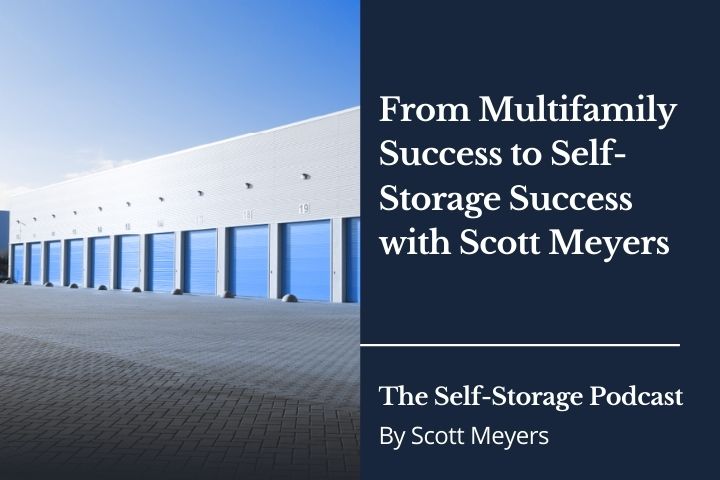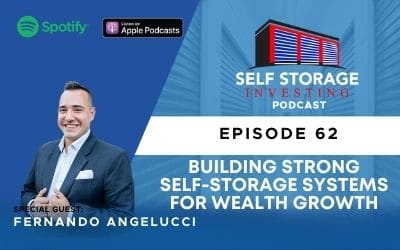From Multifamily Success to Self Storage Success with Scott Meyers
Investing in self-storage facilities is a lucrative venture for real estate investors looking to diversify their portfolio into multiple asset classes.
Announcer(00:01): Welcome to the real estate syndication show, whether you are a seasoned investor or building a new real estate business, this is the show for you. Whitney Sewell talks to top experts in the business. Our goal is to help you master real estate syndication. And now your host Whitney Sewell.
Whitney Sewell(00:20):
This is your daily real estate syndication show. I’m your host Whitney Sewell today. Our guest is Scott Meyer sanctuary balance show Scott. Hey Whitney. Glad to be here. Thanks for having me. I’m honored to have you on the show and I know the listeners are going to be excited to just after hearing your bio and just tons of experience in this industry. And just look forward to getting to know you a little better, but a little about Scott and his company, kingdom storage, hold on. Holdings has acquired, developed and converted over to 2 million, 200,000 square feet. And over 13,000 units in the self storage space with over $160 million in assets under ma under management nationwide, he also founded self storage, investing.com. The nation’s leading education company that teaches people how to find, evaluate finance and manage self storage facilities through his own lawn seminars, coaching mastermind, and podcasts.
Whitney Sewell(01:17):
And also, you know, 10% of his company’s profits is dedicated to our building houses in Mexico and taking his staff partners, students, friends, and family own these all expense paid mission trips to experience the benefits of short term mission trips. Wow. grateful for that. And I want to ask you about it again at the end, Scott, but just grateful for how you give back and in that way too. It’s neat. It’s neat that you are able to take your staff and just give them that experience. And I’m sure that has paid forward so many times. But you know, why don’t you give us a little more about your background. Let’s dive into self storage a little bit you know, over, over 2 million square feet, 13,000 units. I mean, that’s a lot of units. No doubt about it. So definitely many transactions, but give us a little more about your background and let’s jump in.
Whitney Sewell(02:09):
Sure. So got done, got involved in investing in real estate. I think like most people starting out with single family houses. This is back in 1993. Begin to once I got a job and actually had a little bit of money left over to invest and plan for retirement. I begin buying everything. I could get my hands on to learn about the stock market only to find out that most folks, the wealthiest people in Indianapolis let alone in the world had created their wealth in real estate, not in the stock market. So then I delve in learning about real estate and buying home study systems and books, and yes, lo and behold Carleton sheets was the first home study system I purchased and bought my first rental house, rehabbed it, refinanced it, rented it out and then bought two more and just continued on that path until we hit about 75 houses or so with a mixture of a rent to own as well as us just
Scott Meyers (03:00):
Come straight out, flat out landlord just buying to hold on that model too, at some point you know, sell off half and keep the others debt free. Well, didn’t see all the, the passive income and the freedom that Carlton and the others had talked about. And so I thought, well, economies of scale will we’ll fix this and got into apartments. And so we bought several apartments and had about 420 apartment units throughout central Indiana. But, but it seemed to just kind of compound the problem that was you know, even though we had management companies in place, there’s still the tenant toilet business. There’s, you know, there’s no magic. You can’t wave a magic wand over the challenges on you and we still have to pay for the repairs and things that needs to be done. And, you know, many people say that, you know, because we’d love to be in real estate, if it weren’t for the tenants.
Scott Meyers (03:46):
And I thought, well, what, you know, what alternative is there? And there’s either parking lots or self storage, but you can’t really, you know, create value and enforce the appreciation and value in a parking lot. Like you can in self storage. And so does it mean, I look at the modeling, I visited the, the self storage association. They had a meeting up in Chicago, so drove up and learned as much as I could. But at the time there really wasn’t anybody out there that it was really teaching had written books or was, you know, coaching or mentoring on self storage. So I began to digging in on my own and bought my first self storage facility with a partner. And then, yeah, the rest is history, as they say, and saw the lights and realized that if somebody doesn’t pay, you can lock them out and sell their stock to recoup your money.
Scott Meyers (04:29):
It’s a virtually recession. I don’t want to say proof. It’s very recession resistant and inflation resistant because when times are good people buy more stuff and they need more storage and when times are bad and we had into every attraction in the economy or recession like, and this’ll be the third one that I’m going through. You know, we know that self storage benefits greatly cause businesses downsize and individuals downsize, and there’s a rush for storage. And so for those reasons, we, we sold off our houses and apartments and then just went full bore into self storage. And along the way, then created a, a, an education company to teach people how to do this as well. I used to run the central Indiana real estate investors association. And again, holding workshops only to realize that I’m, you know, much like when I was looking to find somebody to mentor from or how to learn, how to get into the business, there really wasn’t much out there.
Scott Meyers (05:18):
And so we created an education company to teach people how to do this as well. And then along the way we began mentoring and holding seminars and conferences and consulting, and then added a partnering component to that, which allowed us to really leverage, you know, the, you know, taking our techniques and strategies and deploying that through others throughout the country. And that is where the lion’s share of our projects come from right now through I’m still joint ventures. I, I speak in and I write for the associations, but the folks that I’ve taught how to get into the business, they bring deals to us as a wholesale that we buy or partner on. And that has been the greatest cause for growth. And the reason why we began to learn how to syndicate in the first place is we had a lot of deals and we just need more equity to be able to take them down.
Whitney Sewell(06:04):
Nice. Wow. No, that’s an, that’s a neat transition. I think many of us see the single family model first, you know, then it takes a little bit to realize, wait a minute, you know, there’s a, this is a created a lot more work for myself, but you had 75 of different things. But you said you, you didn’t see the, the freedom I think you expected is that
Scott Meyers (06:26):
Yeah, yeah, yeah. That was it. Yeah. So you know, it’s at the end of the day and, and by the way, you know, love, love and single family houses and apartments. Cause we were regentrification in certain areas you know, just, you know, taking something and, and, you know, creating value in a time I’ve been a junker all my life that it was bikes and cars and then began with houses and apartments. And that’s great. But there’s just so many moving parts to that and managing the tenants, managing the managers of our apartment complexes and the contractors and with the eviction laws I’m here. And, and as I talked to landlords throughout the country, most of the rest of the country, though, those are in place to really protect the tenants rather than the business owners. And so I thought Kashi, you know, even the best cook in the world, can’t fix them this recipe, which doesn’t seem to taste very good. And so that’s when I began looking for other aspects to invest in real estate because you’re right, we all love real estate because we can borrow money to buy it, know we can force the appreciation and value. And it’s a hard asset that produces income and there’s nothing else like it, if you can find the right vehicle that, that suits you and your market, and you’re able to surround yourself with a good team to be able to manage it
Whitney Sewell(07:33):
When you, when you decided to move into multi-families that he got up, got up to like 400 units. I mean, that’s a, you know, a pretty big accomplishment in itself. Most people don’t get to that size, but you know, what was your, your method for buying those multifamily units? Were you syndicating then? Or were those mostly JV or smaller type buildings? What, what were those?
Scott Meyers (07:52):
Yeah, those are mostly a JVs and bringing in a true partner or two. So we weren’t syndicating it at that point. And so they were smaller complexes. The largest we had was 72 units on the smallest of being, I think 36. And so we were able to find those through just a network I had been involved in, in real estate and with a lot of investors and having run our large group here, didn’t the Hertz. We had a big Rolodex of folks. And so we did find one, I believe, through a broker. And then the other two through just our network or excuse me, the other three through our network.
Whitney Sewell(08:24):
So I guess I’d love for you to elaborate a little more on the thought process behind moving from multifamily to self storage. And obviously, you know, as the listeners know, you know, we have many or hundreds of multifamily personally and, and but you know, the, the self storage arguments is very I think legitimate and, and I’m learning more personally even about myself, but I’d love to, you know, you’ve been on both sides and extremely experienced. So I’d just love to hear you elaborate a little bit on, you know, why, why did you change your focus instead, say syndicating larger multifamily and just, yeah.
Scott Meyers (08:57):
Growing that platform, but to move completely into self storage. I think first of all, when I began to look into it, when either there, there wasn’t a whole lot of folks that were doing it, I also couldn’t find a, again, a lot of information on it. And I think it’s because it was one of the best kept secrets. I mean, the secrets out now, thanks to, well, I guess myself and several others you know, talking about the benefits of self storage, but, you know, there, there just wasn’t much information on it until I began looking into it. But then when you begin to look at the numbers from a business model standpoint again, very, very solid very recession resistant as well as inflation resistance. So it’s not susceptible to, you know, the, the contraction and expansion of the economy. And again, by the nature of it you, you can, I like to spread my risk.
Scott Meyers (09:43):
And so that’s why I got into multifamily, you know, going from single family, you know, slugging it out for a while, until you began buying, you know, apartment complexes and spreading that risk across multiple units, but with one loan and, you know, one business essentially, and then being able to hire property management companies. I mean, that’s, you know, that’s where I think most people aspire to get to because it’s tough and single family until you get to that place. Well, in apartments, and again, still just dealing with that same business model where it felt as if everything and everyone was working against us. You know, if people didn’t pay, we had to continue to chase them. And we were in decent areas, there were a blue collar working class areas. But still, you know, the things folks fall on hard times and things happen in the economy and they’re very susceptible.
Scott Meyers (10:28):
And so to chase that money and, and, and go through these periods in which occupancy is down very low and then having to bring folks in to rehab the units over and over again. And you know, our turn average turn was $1,300. And then going to court only to walk out with a little yellow or pink piece of paper, with very little ability to collect on folks, especially if they’ve lost their job. You know, we just realized that they’re, you know, they’re, there must be a better way. So when we looked at again at self storage, very, very you know, solid and stable people always need stuff. It works better during a recession because people downsize yet they will still, they can afford a 50 to $75 a month storage unit when they move back home or in with their friends.
Scott Meyers (11:09):
And if they don’t pay, we lock them out and then we sell their goods and we get, we recoup our back rent and our late fees. And then when either we’re done with the auction or when somebody just moves out on their own, they’re just, they’re done with the storage unit, you know, rather than a $1,300 turn in lost rent and repairs and carpet cleaning and drywall and everything else. I mean, w we, we take a, a blower, a gas blower and blow it out in 30 seconds and move in the next person that’s waiting in line. So, you know, for that, and many more reasons, we just found that this would, to me, a more solid, stable, predictable business model,
Whitney Sewell(11:44):
You know, I know in, in multifamily, single family, either one, you know, people always say, well, people are always going to need a place to live, and that’s so true. They will always need a place to live, but it sounds like, you know, self storage, it’s kind of like, well, this is a better business model, cause there’s not anybody living here. Okay,
Scott Meyers (11:59):
Exactly. You’re exactly right. And the two, they go hand in hand, you know, when you look in the market, if there’s an apartment going up, my building going up, our, our, our business model is pretty predictable. You know, one in 10 households or seven, roughly seven square foot per capita, you know, we can kind of draw and follow the rings. And if there’s a self storage facility going up and you can pretty much guess if there’s going to be some divisions and apartment complexes going up as well, it’s just a very, very predictable business model.
Whitney Sewell(12:24):
Nice. So, you know, help our listeners. I know, you know, we’ve got just a few minutes left, but before we’ll move into some other questions, but maybe you can give the listener a, just a few good steps to take, to get to their first self storage deal. Maybe that’s their focus. Obviously, we’re, you know, we talk about syndicating, a law in capital raising and, you know, investors
Scott Meyers (12:41):
And things like that. But you know, to syndicate that first apartment deal really, what’s your thoughts on just a few first steps that are most likely to get somebody to their first self storage deal? Sure. Well, I think like anything else, you know, if you’re going to, and we never convinced any money to, to bring money into a deal with us, but they need to understand that, you know, we’re, we’re good at our craft. And so that’s the first step is we, you got to get good at your craft. And so that is through education. Now there’s some you can learn from going to the associations, perhaps some visiting some of the association meetings, if they’re having those right now within your state. But there’s a number of different educational programs out there, coaching, mentoring, and more books on the marketplace now to at least get familiar with the terms, you know, for those that are interested or already investing in and familiar with multifamily and with the underwriting in terms of drilling down to an NOI and a capital capitalization rate, you know, that’s, that’s all very, very similar.
Scott Meyers (13:36):
There’s just different nuances to the underwriting of a self storage facility. And obviously the business model is a little bit different than how to run a facility versus an apartment complex. So going out and getting your first self storage facility, you can get a small one. You know, they’re more, your money goes a lot further and buying more units in a self storage facility. So even buying a small one to get your feet wet without syndicating with someone could certainly be a good way to go again, do your homework. But if you’re getting into syndicating I, I don’t suggest that this be your first one and then try to raise capital. If you don’t have the experience, you, you know, it may take a long time or you have debt, some really good friends and family members that’ll come along with you rather than going out to a wider pool. So, you know, like anything else, I don’t know, secret sauce Whitney, you just got to learn the asset class that you’re asking people to share along with you and partner on
Whitney Sewell(14:27):
What are one or two mistakes that you see people making that are getting in the self storage business, maybe things that, you know, from your experience of so many thousands of units, you know, that you just wouldn’t know when you’re first getting in.
Scott Meyers (14:40):
Yeah. So I think I’m perhaps a product of the industry is the fact that you know, most folks that will call it a very simple, predictable business model. And, you know, it’s just a bunch of metal boxes on concrete slabs. You know, there’s, there’s nothing, you know, rocket science to it, and it’s very easy and very profitable and, you know, low loan, default rates, you know, they just, you, you can’t go wrong because you have the fact that it’s self storage, you know, working for you. And they treat it as a hobby rather than a business. And they don’t really dig in and learn how to run it. They don’t hire either a property management company, if it’s out of state or even if it’s a large facility, you can’t know the intricacies of a market, that’s a one or two States away by trying to manage it yourself. And also just the underwriting to begin with, you know, you make money on a stock when you, you buy it. And it’s the same with real estate. So getting really good at, or hiring a consultant and somebody to assist in the due diligence, just to make sure that you’ve crossed all your T’s and dotted all your I’s before you sign on the dotted line. So those are just a few nice. So
Whitney Sewell(15:43):
What are maybe what’s maybe the hardest part of this, the syndication business for you, whether you know, maybe in a specific stage or getting into the business or even something recently?
Scott Meyers (15:53):
Yeah, I think recently is we, you know, when we think we have a solid offering and we look at the landscape and what you know, similar multifamily apartments, mobile home parks, you know, commercial real estate that is tenant based, you know, it was going for in the marketplace. And we put on an offering, you know, we expect it to fill up pretty quickly. And that’s not the case right now. We’re still, there’s. Some folks are still sitting on cash and we, we may have good returns from a preferred return standpoint and equity, multiples, and timeframe with recover. You know, we ticked all the boxes. But right now there’s some folks that are just sitting on some cash or maybe waiting to see. And, and we have more projects that we’re working on as a result of the fact that again, self storage is so strong and there’s a lot of projects out there that we’ve been pursuing and a lot of folks wanting to invest in it.
Scott Meyers (16:39):
And we’re seeing record numbers of folks that are, you know, taking down our packages and attending our webinars, but not as many that are pulling the trigger and on, on some very solid offerings. So those, I think that may be some of the challenges to, to make sure that we’re, and we’re calling and talking to these folks and finding out what their sweet spot is, or, you know, what it is that they may want to see in the next one. And again, there doesn’t seem to be any secret sauce right now. It’s just a fact that I think there’s a lot of unknown and there’s a little lack of clarity from the investment pool right now that has a scratching our heads a bit projects are all still moving forward and investors are very happy, but you know, we don’t seem to, I guess we can’t get into the heads of all investors to know just exactly what’s going to work right now. And, and perhaps we never will.
Whitney Sewell(17:24):
Bedford’s cost segregation specializes in generating significant tax savings via their engineering based studies for commercial real estate clients nationwide founded in 2002. Bedford is one of the largest independently owned cost segregation providers in the country with over 14,000 studies completed to date and multiple offices throughout the most important decision ownership can make when incorporating cost segregation within the real estate portfolio is selecting the right provider with only 43 certified cost segregation professionals. Nationwide Bedford is proud to employ eight of them and takes the quality of their people as seriously as their studies, every certified cost segregation, professionalized pass a rigorous test, combining knowledge of technical engineering issues, legal tax issues, ethics standards, and requires a strict level of prior work experience to be eligible bottom line, not all cost segregation providers are created equal. So be sure to take the decision seriously from the beginning to protect yourself for years to come, please contact Bedford’s business development director, Frank Giudice to learn more. So what what’s a way, or how do you prepare for a downturn or, you know, maybe like we’re experiencing now what, you know, in the self storage business, what are some ways that you’re hedging against, you know, a downturn?
Scott Meyers (18:49):
So we’re, we’re moving away from, we’ve been having on the development side of the business, because we’ve had a, a lack of supply for so long and, and the self storage industry has been in the building phase for the past probably five to seven years or so, but even that they’re still there. The landscape is still right for many other storage opportunities. Our, our market is really just a three mile radius. That, that is what the market is in terms of how we look at demand for a particular site or spot. But we also recognize that funding’s a little tougher on the development projects that banks have pulled back a little bit. And I think our investors are looking at it at the same. So our, our model is changing and that our existing facilities are filling up. And so we, as long as interest rates does say low, we may be exiting, but we’re also looking for other existing facilities where some of the mom and pops, some of the folks that are ready to retire, they may want to try to weather another recession, or maybe they’ve had increased competition and lower rates that are looking to sell.
Scott Meyers (19:46):
We’re looking to add more existing, already cash flowing projects with upside, and maybe just some turnarounds to the portfolio. That’s been the focus for the past probably 90 days or so even pre COVID and a, and that’s what we’ll continue to focus on. There’s some of these folks also that did buy several years ago and treated this as a hobby and they didn’t create enough value when they bought it at a 90% LTV loan. And now they’re going to refinance it at 65 to 70 because that’s all the banks will do during a recession. And they may be left with no other options other than to come to the closing table with cash or to sell. And so, we’re poised to take advantage of that and be looking at buying those existing facilities.
Whitney Sewell(20:28):
Nice. So what’s a way that you’ve recently improved your business, that we could apply to ours. Oh, wow.
Scott Meyers (20:34):
Gotcha. Staffing. We have had the opportunity right now. Again, we, we certainly, we don’t, we don’t celebrate a pandemic or a recession, but self storage we’re in the trauma and transition business and naturally the industry just, we do benefit from businesses, downsizing and individuals. And unfortunately the recession that is coming along with it has produced a, a large pool of very qualified people in real estate and the financial services side of the business. And so we’ve been able to, as we’ve been growing and taking on more projects we’ve been able to find some very key individuals that that we’re very fortunate to have that may not have been in the labor pool if we had been looking for months ago. So I think that’s it, it’s all about you know, we could talk for hours, probably Whitney, you and I both about staffing and getting the right people on the bus and the right value it is.
Scott Meyers (21:29):
And you know, we’ve, we’ve learned over the years that you just, you cannot bend. They may be a rock star on paper, but until we have three and four interviews and personality testing and really date them and find out that they share our core values we’re not going to put them on the bus and they won’t have a seat as Jim Collins puts it. Yeah. I would love for us to talk about that further. I know that would help a lot of listeners as well and, and learn more about your all’s onboarding process and finding people, but hopefully we can do that same but you know, what’s a way right now, or the best source for meeting new investors right now.
Scott Meyers (22:06):
You know, we have a, we’ve been putting out some five Oh six CS, which allows us to be able to market a little bit differently and we’re seeing some results from that, but I think more than anything, it’s, I’m doing the same things that we’ve been doing, which is we have our own podcast and being able to be a guest on, on yours as well as others, and really just doing what we’ve been doing, putting out articles. We have a lot of information that goes out from the education side of our business, as well as of the investing side being active in forums. And you know, I I’ve always considered myself kind of the, the, the policeman or the watchdog of the forums, some of the bigger ones out there that that everyone’s aware of. And there’s a lot of free advice out there that people give on self storage where I have to come back in and say, well, that’s, that’s not really true. That’s not correct. And some things are, Oh, that’s illegal. And in other instances, just, you know try to sift through the advice that some of the new folks are looking at getting into, and by nature of just doing that and being active in various places to make sure that people are doing things the correct way is, has been, you know, a big draw, a reason why people are drawn to us and wanting to learn more about what we do. What’s the number one thing that’s contributed to your success?
Scott Meyers (23:24):
I don’t know that it’s cliche or not. I it’s just, just integrity. I mean, you look at the landscape across both the industries that I’m involved in from, you know, the educators and the information marketers to investors. Eventually that catches up with you on playing the long game. And we never, I never get into real estate and quit my fortune 500 job to end up coming back to that. You know, this is a marathon and, especially into the, in the world of today’s social media transparency, I mean, you can’t slip up too many times, usually once. And I would be out of the education business and the investing business, and certainly the syndication business. And so, you know, every step of the way we just don’t push the boundaries. We don’t push the deals.
Scott Meyers (24:06):
We are good stewards of our staff, our investors, our students, and everybody that we come into contact with, and that has paid dividends. And if something, you know, we don’t even dance up to the line of which we may be coloring the truth on a project or anything else or just even being overly optimistic about something. We take a feasibility study and we beat it up and we’ll have them change it. If it’s I’m suppose if the market we find is actually even worse or the deal is worse. And then we add another buffer and a layer, and just to be certain that that we are safe, our investors are safe. And that just permeates through all facets of our business. And that shows, I think, you know, people can see that and understand it and realize that when you, when you meet with syndicators and, and other folks who you joint venture with, and what you see as a, is what you get with us. And there’s there, there’s nothing hidden. And certainly, you know, everything that we say that we do, we better be able to back up.
Whitney Sewell(25:01):
No, I, I agree completely and think that’s, that’s really just having the long game in mind and, and just being as Integris as possible. And I appreciate that very much so, and I want to go and tell the listeners to Scott and I were talking and he had it his team had put something in his bio or, or just some things they sent us just talking about how they believe their success is due to the way they treat their staff and their investors. And I just think that that level of integrity just shows and a, and Scott’s going to come back and we’re going to talk about that a little more in detail. And I think we can all learn so much from his level of success and just how they contribute so much of that, to how they treat their staff and their investors. So, Scott, I’m looking forward to that. I know the listeners will be as well. Why don’t you tell us that or elaborate a little more on how you, how you like to give back?
Scott Meyers (25:47):
Sure. So early on my wife and I mean, we decided to get into real estate and get out of our corporate jobs so that we could have that then that passive income and the freedom to raise our kids and we homeschooled, and we’ve been able to travel around the country and be active in their lives. That was a big piece of it. The biggest piece of why we decided to go on this journey. But the second piece is that we realized that, you know, this, this business is a mission field for us. And we tie the, on our profits in both our education business and our investing business. And then we go on mission trips. We take that money and we take our staff. We take our, our family, our friends, coworkers, students, partners, vendors, anybody who wants to go.
Scott Meyers (26:28):
And we build houses. We partner with Y wham youth with a mission and their division called homes of hope. And we go to Mexico and the Dominican Republic, and we’ll take anybody along who wants to go and have that experience of a short term mission trip. We’re gone for four days. We built a house on a day and a half, and then we give the keys away to a deserving family and take all those folks along so that they can experience a family oriented for term mission trip on our dime. We pay for it. All you have to do is get to the airport in San Diego, and then we take care of the rest. And we’re on houses 15 and 16, and we’ll be building in November. And this is a, this is truly our way of giving back and been involved with this for a number of years and just absolutely passionate about ending generational poverty, one family, and one house at a time.
Scott Meyers (27:14):
Love that, love that, that just your willingness to share that and how you give back and taking people with you. I just think that’s, it’s not just giving to that one family that you’re building a house for, but all these families are experienced getting to go. So that’s incredible. Scott, how can the listeners get in touch with you and learn more about you? Sure. The best way is wait, if they want to learn about dumb self storage investing, go to self storage, investing.com. And my email address is Scott at self storage, investing.com and on the passive side of the business. And for those that may be interested in looking some of the projects we have coming up, passive storage, investing that come where they can take a look at it and pull down some other free information, as well as taking a peek at some of our past deals and some of our current offerings.
Announcer(27:56):
Thank you for listening to the real estate syndication show brought to you by LifeBridge capital LifeBridge capital works with investors nationwide to invest in real estate. While also donating 50% of its profits to assist parents who are committing to adoption. LifeBridge capital, making a difference, one investor and one child@atimeconnectonlineatwwwdotlifebridgecapital.com for free material and videos to further your success.
















